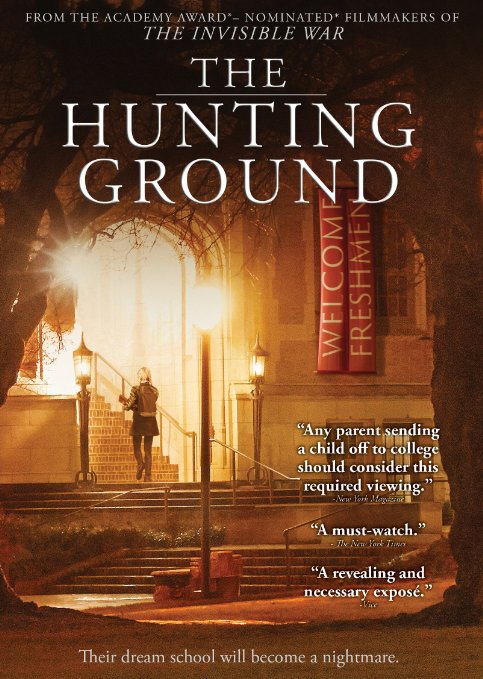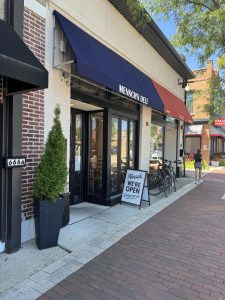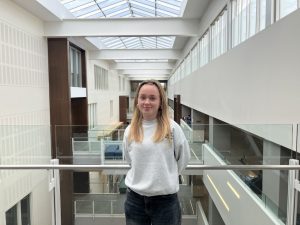Students question effectiveness of “Hunting Ground” viewing
Sexual assault film yields disappointing turnout of under 10% of senior class
May 22, 2017
On Apr. 5, the senior adviser chairs sponsored a showing of the documentary “The Hunting Ground” to help educate the senior class on sexual assault on college campuses. Attendance was optional, which resulted in low attendance.
As juniors and sophomores sat for standardized tests on the rainy April morning, around 100 students from the approximately 1,100 student senior class showed up to participate in the showing and discussion of the film.
The empty auditorium was equally disappointing and predictable. “A lot of people, myself included, were upset because the school said that the day was optional,” senior Hannah Coffey said. “And when you tell fourth quarter seniors that there is an optional school day, they don’t even care what the topic is; they are not going to show up.”
Senior Liza Boscow mirrored Coffey’s perspective, “It’s really great that they thought to do this, but I don’t think they did it in the right way by making it optional. It seems like they gave up on the idea by making it optional without even encouraging kids to go.”
Although many students didn’t attend the film, senior advisers were told to address the topic. “We were strongly encouraged to show ‘The Hunting Ground,’ and to be honest, I don’t think we would have had the idea at all had our adviser chairs not set up this opportunity for us and introduced us to the film,” engineering teacher and boys senior adviser Alex Howe said.
Howe showed his advisery parts of the documentary with a group of other advisers and they discussed the culture that propagates sexual assault on college campuses.
“It was important for me to be honest with my group and say that these are real pressures in college,” Howe said.
“We are talking about human beings and just the language that we use like ‘Did you get the girl’ is inappropriate because we are talking about someone’s sister, someone’s daughter,” said Howe.
Some students see this derogatory diction breeding in New Trier hallways and locker rooms.
“I’m frustrated because I know the culture of New Trier and I know that students need to see this documentary are not here,” said senior Ben McCormick, who attended the screening.
McCormick described the disrespectful and sexist culture he witnesses at New Trier, “Instead of sex being a consequential thing and relationships being healthy, it’s about conquest and dominance. It’s unhealthy and it contributes to the culture that enables people to get away with sexual assault.”
Senior James Aitken expressed a similar message, “You know people say a lot of things but nobody actually does anything. A lot of people will brag about stuff that they never did and they talk about stuff they would like to do but will never do.”
Although Howe worked hard to deliver this harrowing message and to bring to light the inappropriate language, Aitken, one of Howe’s advisees, acknowledged the importance of the conversation but said, “It was in the morning so it was hard to tell how many people were actually watching it.”
To many students, advisery periods seemed inappropriate to be discussing such serious, relevant topics. “It’s a horrible, horrible idea to fit a huge conversation into an advisery period because it’s not possible and it’s eight in the morning and nobody is ready,” Boscow said.
Although the senior adviser chairs provided resources and information for advisers to discuss the topic further, there was a discrepancy in the information students were receiving, with some seniors having little or no discussion on the documentary.
The discussion, too, leaned more toward girls’ adviseries, which according to some students, faced more pressure to go to the screening.
“The thought was good, the execution was less than ideal,” Boscow said. “It really felt like a lot of girl adviseries were saying ‘you should go and you should see it’ and the guy advisers were saying ‘I know none of you are going to go.’ Telling girls to watch out is not stopping the problem. We have to tell boys and girls that this culture isn’t acceptable, and I don’t think the school did that.”
English teacher and adviser Ariell Bachman reflected Boscow’s perspective. “This kind of topic has to be handled in full or not handled at all,” she said. “It can be very triggering and it can be very sensitive for students. It’s a thing that you either commit to doing or you don’t.”
Bachman presented the documentary to the senior advisers last year after her advisery watched the film. They were adamant about their belief that all senior adviseries—boys and girls—should watch the documentary.
While the administration decided there was no time to show it to the class of 2016, they created the optional 2017 viewing to highlight and start the discussion of sexual assaults on college campuses.
“The Hunting Ground” tells the story of women and men who were sexually assaulted on college campuses. It outlines the alarming aftermath of their attacks with virtually no colleges punishing the attackers.
The documentary follows two survivors who filed Title IV acts against their schools for not protecting their rights to an education, declaring that the rape culture on campus was infringing on their rights to an equal education.
The documentary is startling not only for its recollection of sexual assaults and the aftermath these students face, but also for the horrifying statistics that expose the prevalence of these crimes.
When asked about why the documentary was important, Bachman said, “It said in the documentary that one in four women on a college campus will be victims of some sort of sexual assault, and when I look around an adviser room, that’s an average of six women in an advisery, and that breaks my heart. I can’t even handle thinking about that happening to my advisees.”











































